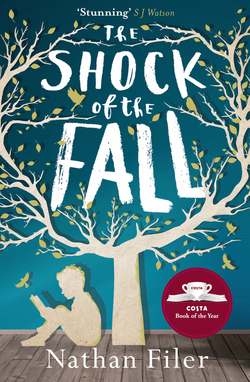Читать книгу The Shock of the Fall - Nathan Filer, Nathan Filer - Страница 13
mon ami
ОглавлениеHe used to burst through the door, waiting at the foot of my bed all wide-eyed and unblinking. Some mornings I wasn’t in the mood so sent him away. I regret that now.
But mostly his enthusiasm was catching, so even if I was half asleep I’d get out of bed to load up the N64, and we’d sit on our beanbags playing Mario 64, arguing over whether Luigi could be unlocked as a character. Then at quarter to seven our dad would come through to tell us we should work hard at school today, and that he was off to earn a crust. That is the kind of thing my dad says. He says, earn a crust. I like it.
The other reason Dad used to come into my bedroom was so Simon and me could do this thing we used to do. What we’d do is listen out for him as he walked across the landing towards my bedroom door. He was easy to hear because he wore heavy steel-toe-capped boots, and because he wanted us to hear him. So he would walk deliberately heavy-footed, and usually say something loud and obvious to my mum like, ‘Bye bye then darling. I’m just going to say cheerio to the boys.’
As soon as we heard him say that, Simon and me would quickly hide behind the door, so when he looked in he wouldn’t be able to see us. He’d step inside pretending to be confused, saying something under his breath like, ‘Where have those boys got to?’
It was stupid really, because by this time Simon wouldn’t be able to stop from giggling. That didn’t matter though, because we all knew it was just pretend. And it was fun. The most fun thing was at this point Simon and me would leap out from behind the door, and wrestle Dad to the ground.
That is what we used to do when Simon was alive, but now Simon wasn’t alive, I never got up before my dad. At quarter to seven he would still come into my room to find me lying awake, unsure of how to begin. That must have been hard for him.
He came in every morning anyway, to sit beside me for a few minutes and just be there.
‘Morning mon ami, you okay?’ He ruffled my hair, in that way grown-ups do to children, and we did our special handshake. ‘You going to work hard for Mummy today?’
I nodded, yes.
‘Good lad. Work hard then you can get a decent job and look after your old pa, eh?’
‘I will mon ami.’
It started in France when I was five years old. This was our only holiday abroad, and Mum had won it in a magazine competition. It was something to be proud of, first prize in a True Lives writing contest, eight hundred words or less about what makes your family special. She wrote about the struggles and rewards of raising a child with Down Syndrome. I don’t suppose I got a mention. The judges loved it.
Some people can remember way back to the beginning of their lives. I’ve even met people who say they can remember being born.
The farthest back my mind can reach puts me standing in a rock pool, with my dad holding one of my hands for balance, in the other I’m clutching my brand new net, and we are catching fish together. It isn’t a whole memory. I just keep a few fragments; a cold slice of water just below my knees, seagulls, a boat in the distance – that sort of thing. Dad can remember more. He can remember that we talked, and what we talked about. A five-year-old boy and his daddy chewing the cud over everything from the size of the sea to where the sun goes at night. And whatever I said in that rock pool, it was enough for my dad to like me. So that was that. We became friends. But because we were in France we became amis. I don’t suppose any of this matters. I just wanted to remind myself.
‘Right then. I’m off to earn that crust.’
‘Do you have to go, Dad?’
‘Only until we win the lottery, eh?’ Then he winked at me (but not in a Steve way) and we did our special handshake again. ‘Work hard for Mummy.’
Mum wore her long nightdress and the silly animal slippers Simon had once chosen for her birthday. ‘Morning baby boy.’
‘Tell me about France again, Mum.’
She stepped into my room and opened the curtains, so that for a moment, standing in front of the window, she became nothing but a faceless silhouette. Then she said it again. Just like before. ‘Sweetheart, you look pale.’
